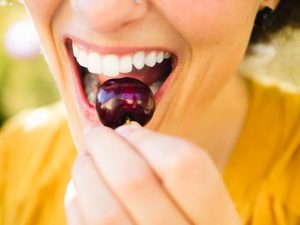 With food becoming streamlined and faster to consume, it’s common to find food blended into smoothie form, claiming it “releases all the nutrients.” Well, that may be true—in a recent study, researchers found that mastication, otherwise known as chewing your food, may actually help you more than you think. They found that the act of chewing prompts the release of an immune cell that can protect against infection.
With food becoming streamlined and faster to consume, it’s common to find food blended into smoothie form, claiming it “releases all the nutrients.” Well, that may be true—in a recent study, researchers found that mastication, otherwise known as chewing your food, may actually help you more than you think. They found that the act of chewing prompts the release of an immune cell that can protect against infection.
A research team at the University of Manchester in the United Kingdom found that cells from our adaptive immune system called T helper 17 (Th17) were released when a person chewed their food. Th17 cells use specific antigens to defend against potentially harmful pathogens, but do not disturb the normal bacteria known to be beneficial to our health. Previous research has shown that this particular immune cell was produced in the gut through the presence of gut bacteria, but it wasn’t until recently they discovered how Th17 was produced in the mouth.
Advertisement
Th17’s production was theorized to be the result of the abrasion and damage that occurs in the mouth due to mechanical force. In order to test this theory, rodent studies were utilized. The method of investigation involved feeding weaning mice soft-textured foods, which naturally require less chewing, until 24 weeks old. After this time period, the Th17 cell levels were measured from the rodent’s mouths and found to be significantly reduced. The researchers then sought to increase the level of physiologic damage in the rodent’s mouths by rubbing the oral cavity with a sterile cotton applicator. This simulation led to an increase of the immune cell.
“The immune system performs a remarkable balancing act at barrier sites such as the skin, mouth, and gut by fighting off harmful pathogens while tolerating the presence of normal friendly bacteria. Our research shows that, unlike at other barriers, the mouth has a different way of stimulating Th17 cells: not by bacteria but by mastication. Therefore, mastication can induce a protective immune response in our gums,” said Dr. Joanne Konkel.
Dr. Konkel and his colleagues believe that chewing our food can actually help protect us from illness, but caution that too much of this immune cell may not always be beneficial. Increased oral Th17 production can increase the risk of periodontitis, or gum disease, which has been linked to numerous other health conditions such as diabetes and rheumatoid arthritis.
With this in mind, the researchers wanted to investigate the effect of long-term exposure to physiological damage caused by chewing and if it could make gum disease worse. They achieved this by feeding weaning mice once again, but with hardened food pellets for up to 24 weeks, and they found that the mice had increased periodontal bone loss due to mastication-induced physiological damage when compared to the previous study with mice fed soft-textured foods.
This result did not deter the resolve of the researchers, however, as they believe that inflammation in the mouth is linked to the development of various diseases around the body and that understanding this concept can aid in better regulating the immunity of the oral barrier, potentially leading to new treatments.
